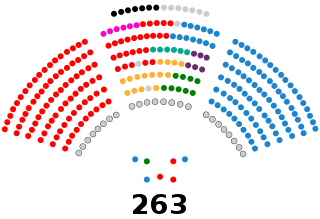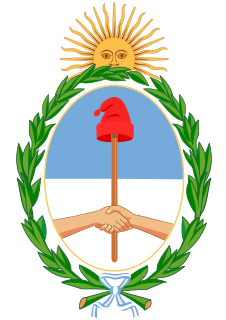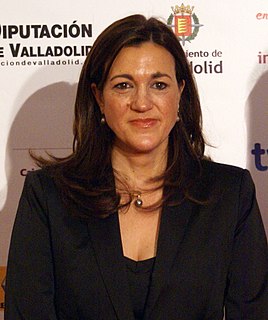
The president of the Government of Spain, commonly referred to in Spain as Presidente del Gobierno, and known in English as the prime minister of Spain, is the head of government of Spain. The office was established in its current form by the Constitution of 1978 and it was first regulated in 1823 as a chairmanship of the extant Council of Ministers, although it is not possible to determine when it actually originated.

The Congress of Deputies is the lower house of the Cortes Generales, Spain's legislative branch. The Congress meets in the Palace of the Parliament in Madrid.

The Senate is the upper house of the Cortes Generales, which along with the Congress of Deputies – the lower chamber – comprises the Parliament of the Kingdom of Spain. The Senate meets in the Palace of the Senate in Madrid.

The Congress of the Union, formally known as the General Congress of the United Mexican States, is the legislature of the federal government of Mexico consisting of two chambers: the Senate of the Republic and the Chamber of Deputies. Its 628 members meet in Mexico City.

The Mexican Empire was a constitutional monarchy, the first independent government of Mexico and the only former colony of the Spanish Empire to establish a monarchy after independence. It is one of the few modern era, independent monarchies that have existed in the Americas, along with the Brazilian Empire, and the First and Second Haitian Empires.

The Chamber of Deputies is the lower house of Chile's bicameral Congress. Its organisation and its powers and duties are defined in articles 42 to 59 of Chile's current constitution.

The National Congress of Chile is the legislative branch of the government of the Republic of Chile.

The Congress of the Republic is the unicameral legislature of the Republic of Guatemala. The Guatemalan Congress is made up of 160 deputies who are elected by direct universal suffrage to serve four-year terms. The electoral system is closed party list proportional representation. 31 of the deputies are elected on a nationwide list, whilst the remaining 127 deputies are elected in 22 multi-member constituencies. Each of Guatemalas's 22 departments serves as a district, with the exception of the department of Guatemala containing the capital, which on account of its size is divided into two (distrito central and distrito Guatemala). Departments are allocated seats based on their population size and they are shown in the table below.

The Chamber of Deputies, officially the Honorable Chamber of Deputies of the Argentine Nation, is the lower house of the Argentine National Congress. It is made up of 257 national deputies who are elected in multi-member constituencies corresponding with the territories of the 23 provinces of Argentina by party list proportional representation. Elections to the Chamber are held every two years, so that half of its members are up in each election, making it a rare example of staggered elections used in a lower house.

The Congress of the Republic of Peru is the unicameral body that assumes legislative power in Peru.

The Plurinational Legislative Assembly is the national legislature of Bolivia, placed in La Paz, the country's seat of government.

The Congress of the Argentine Nation is the legislative branch of the government of Argentina. Its composition is bicameral, constituted by a 72-seat Senate and a 257-seat Chamber of Deputies. The Senate, whose members are elected to six-year terms renewable by thirds each two years, consists of three representatives from each province and the federal capital. The Chamber of Deputies, whose members are elected to four-year terms, is apportioned according to population, and renews their members by a half each two years.

The president of the Congress of Deputies is the speaker of the Congress of Deputies, the lower house of the Cortes Generales. The president is elected among the members of the Congress and he or she is, after the king and the prime minister, the highest authority in the Kingdom of Spain.

María Soraya Rodríguez Ramos is a Spanish lawyer and politician who has been serving as a Member of the European Parliament for Ciudadanos since 2019. She previously was a Deputy of the PSOE in the Congress of Deputies.

Meritxell Batet Lamaña is a Spanish jurist and politician member of the Socialists' Party of Catalonia, currently serving as President of the Congress of Deputies. Prior to this, she served as Minister for Territorial Policy and Civil Service of the Government of Spain between June 2018 and May 2019.

Pablo Torello is an Argentine politician, currently serving as National Deputy elected in Buenos Aires Province. A member of Republican Proposal, Torello was first elected in 2015. He previously served as a member of the City Council of Bragado from 2013 to 2015.

Victoria Morales Gorleri is an Argentine special education teacher and politician, currently serving as National Deputy elected in the City of Buenos Aires. A member of Republican Proposal, Morales Gorleri was first elected in 2019 and sits in the Juntos por el Cambio parliamentary inter-bloc.

María Liliana Schwindt is an Argentine politician who served as a National Deputy elected in Buenos Aires Province on two occasions: she was first elected in 2013, and ran for re-election in 2017, as part of the 1País list, but was not elected. She assumed office in February 2020 in replacement of Felipe Solá. She is a member of the Renewal Front.

Natalia Soledad Villa is an Argentine politician who served as a National Deputy elected in Buenos Aires Province from 2017 to 2021. She is a member of Republican Proposal (PRO). Since 2021, she has been a member of the Vicente López Partido City Council, a post she held from 2013 to 2017 as well.

Diego Horacio Sartori is an Argentine politician currently serving as a National Deputy elected in Misiones Province since 2019. A member of the regionalist Front for the Renewal of Concord (FRC), Sartori previously served as deputy from 2003 to 2007. He also served two consecutive terms as mayor of his hometown, Leandro N. Alem, from 2011 to 2019. In addition, he has served as a member of the provincial legislature of Misiones on two occasions.